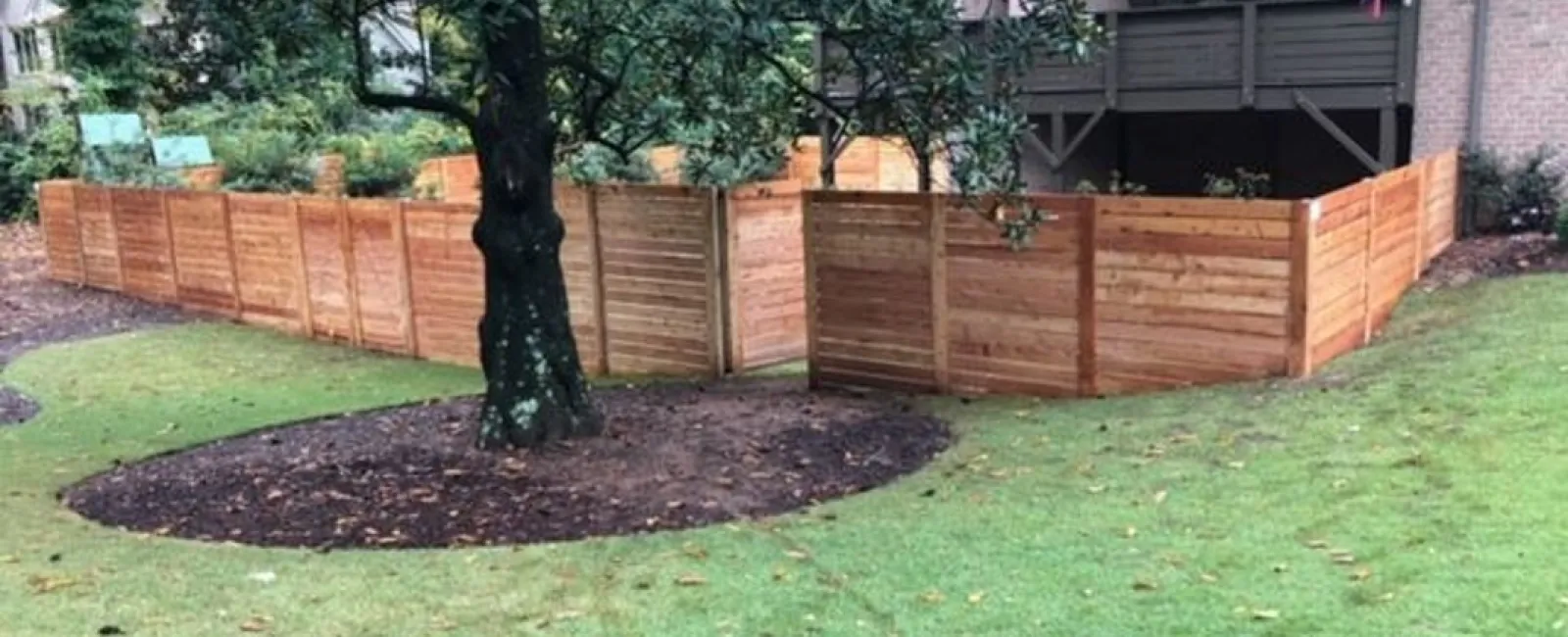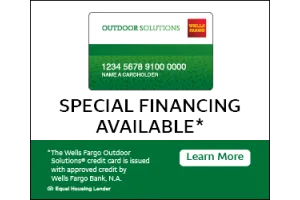Building a fence on uneven ground presents several challenges. This issue is especially common in and around Atlanta.
Atlanta has one of the highest elevations of any major city east of the Mississippi River. Situated in the foothills of the Appalachian Mountains, the Atlanta area features a rolling topography.
That topography often results in hilly and uneven building lots. When installing a fence, it’s important to consider the best fencing options for slopes.
The Challenges of Building a Fence on Uneven Ground
Installing a durable and attractive fence can be challenging. When you’re working on a slope, those challenges double.
Building a fence on uneven ground requires measuring the land to determine the slope. It also requires proper installation. You want to ensure your posts are level and secure to keep your fence from leaning.
Just a few of the issues involved with building a fence on a slope include:
- Calculating the Slope Percentage
- Correct Use of Tools and Equipment
- Drainage Issues
- Ensuring Stable Post Foundations
If these steps are handled incorrectly, your fence can experience serious structural issues down the road.
What is the Best Fence for a Sloped Yard?
Stepped Fencing
A stepped fence is built in separate sections rather than in a straight line. Each panel is installed at a different height, giving the appearance of steps. Staggering the height of the panels allows the fence to follow the slope of the yard.
However, stepped fencing does have one drawback. The fence panels are installed at right angles to the fence post. That leaves a gap along the bottom part of the fence.
Unless covered with landscaping such as shrubs or large rocks, that gap allows pets room to escape. It can also provide access to pests like raccoons and groundhogs.
Level Top Fencing
A level topped fence is a good option for lots with low spots rather than steep slopes. The process for installing level top fencing involves filling in dips with soil, gravel, or a combination of the two.
After that, the fencing installation follows the normal steps. Some areas may continue to show a gap along the bottom after the ground settles. However, the addition of flower beds or hedges can help disguise and cover these gaps.
Level top fencing involves more site preparation than other fencing options. It’s also unsuitable for lots with big hills or very uneven terrain.
Racked Fencing
Racked fencing is manufactured specifically to accommodate uneven ground. The horizontal rails follow the slope of the yard. That means the pickets are not square with the rails. They connect at an angle so that they can point straight up.
By running the rails parallel to the ground, racked fences eliminate the gap along the bottom. This helps ensure that pets and children stay in your yard. It also provides better security against unwanted intruders of both the human and animal variety.
Additionally, racked fencing provides a more uniform look that some other fencing options. They’re also less likely to experience structural issues like leaning, as the posts are all set at the same depth.
However, racked fencing may not work for very steep slopes. The limit is often a 12-inch change in grade across a 6-foot section of fencing.

What Type of Fence is Best for a Hill on a Commercial Property?
There are several suitable commercial options for building a fence on uneven ground. Privacy, security, and aesthetic needs will help determine which fencing option is right for your business.
Chain Link Fence
Budget-friendly and easy to install, chain link is an effective fencing option for sloped lots. Because chain link is woven metal mesh, it’s more malleable than other fence materials.
Installing chain link on a slope involves setting the posts and unrolling the wire mesh at an angle. Installers will bias cut the ends of the mesh. They also cut the top and bottom rails at an angle so that they align with the posts.
Chain link provides security, and comes with several options to provide privacy. These include privacy slats, woven wire mesh, and wooden panels. However, chain link may not be the best option if aesthetic appeal is a top concern.
Wooden Privacy Fence
For commercial properties that require privacy, a wood fence is a suitable option. A wood fence provides both security and privacy. Additionally, it’s aesthetically pleasing.
The traditional dog ear wooden fence also offers the benefits of racking. Posts and rails are installed along the slope, and then pickets are individually placed. This eliminates any gap along the bottom, helping ensure your property stays secure.
Commercial Grade Aluminum Fence
For businesses that want to maximize security, visibility, and aesthetic appeal, aluminum may be the best choice.
Commercial grade ornamental aluminum works well for light commercial settings. These include restaurants, churches, and small shopping centers that feature uneven terrain. Because aluminum is rackable, it follows the slope of the ground.
In addition to being visually pleasing, aluminum is also durable and virtually maintenance free. This makes it a smart investment for commercial properties that get a lot of consumer traffic.
Contact First Fence of Georgia for All Your Fencing Needs
If you have additional questions about building a fence on uneven ground, our knowledgeable professionals can help. We offer custom built fence designs to suit your needs. You can reach us at (770) 422-9996


